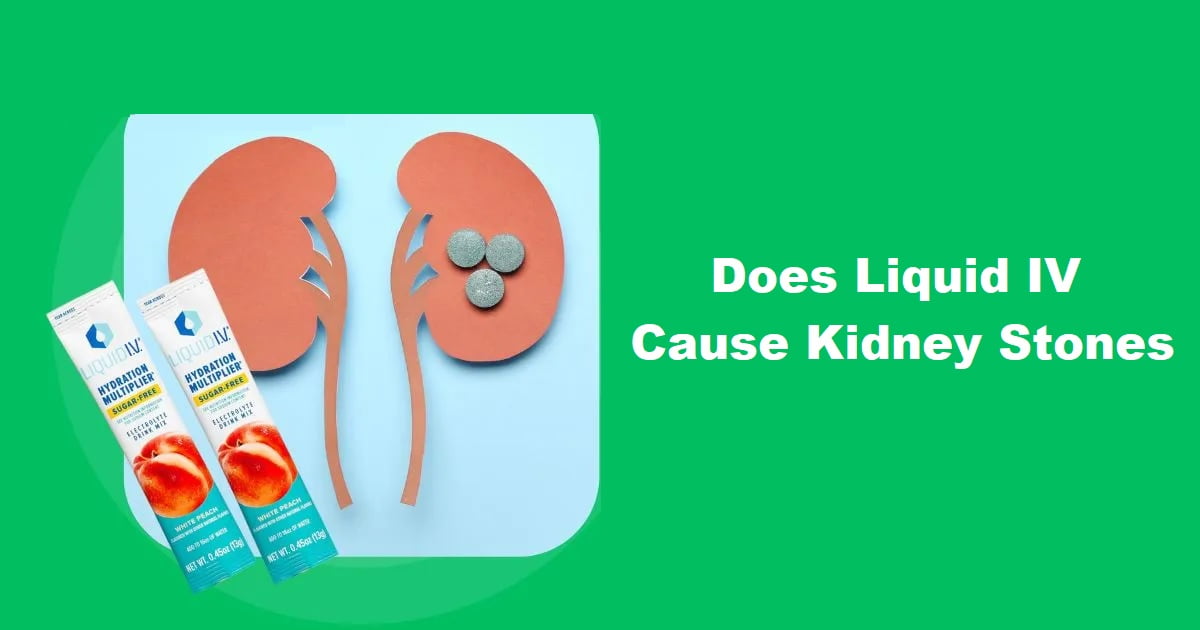
Can Liquid IV Hydration Cause Kidney Stones?: Liquid IV is an electrolyte drink mix that is designed to help hydrate people quickly and effectively. The powdered drink mix contains vitamins, minerals, and other electrolytes that aim to replenish what the body loses through sweat and activity. While Liquid IV can provide a variety of benefits related to hydration, some people wonder if it could potentially cause kidney stones. This article explores the ingredients in Liquid IV, how it works in the body, and whether there is any evidence that it could contribute to kidney stone formation.
How Does Liquid IV Work?
Liquid IV works through a process called cellular transport. The electrolytes, vitamins, and minerals in the drink are absorbed through the wall of the small intestine and enter the bloodstream. From there, they move into cells and pull water along with them, helping to hydrate the body at a cellular level.
Key electrolytes in Liquid IV include:
- Sodium
- Potassium
- Calcium
- Magnesium
It also contains vitamins like vitamin C, B vitamins, and zinc. The osmolarity, or concentration of dissolved particles, in Liquid IV is designed to help the body absorb water and electrolytes more efficiently compared to drinking plain water.
By hydrating cells and providing electrolytes, Liquid IV aims to:
- Replenish fluids and electrolytes lost through sweat, vomiting, diarrhea, etc.
- Provide energy and relieve fatigue
- Help prevent muscle cramps and headaches caused by dehydration
- Improve physical performance
Overall, Liquid IV is intended to be an effective way to stay hydrated and balanced, especially during illness, intense exercise, heat exposure, or heavy alcohol consumption. The convenient powdered formula allows you to mix it anywhere with water.
Liquid IV Ingredients
The main ingredients in Liquid IV that relate to electrolytes and hydration are:
Sodium
- Helps regulate fluid balance and blood pressure
- Lost in sweat during exercise
Potassium
- Important for heart health, muscle function, and nerve signaling
- Lost in sweat and urine
Calcium
- Important for bone health and muscle function
- Lost in sweat
Magnesium
- Helps regulate muscle and nerve function
- Lost in sweat
Vitamin C
- Boosts immune health and acts as an antioxidant
- Lost in sweat
B Vitamins
- Help convert food to energy
- Lost in sweat and urine
Zinc
- Supports immune health
- Lost in sweat
The concentrations of these electrolytes in Liquid IV are designed to effectively replenish the body when dehydrated or depleted. They aim to match the proportion of electrolytes normally found in the blood plasma.
Is There a Link Between Liquid IV and Kidney Stones?
Kidney stones form when concentrated minerals accumulate in the kidneys, crystallizing and turning into hard deposits. While electrolyte drinks like Liquid IV contain minerals like calcium, potassium, and magnesium, there is no evidence that they directly cause kidney stones in healthy individuals.
However, some health factors can impact kidney stone risk:
Dehydration
Dehydration causes urine to become more concentrated with electrolytes like calcium and magnesium. This increases the chance of them crystallizing into stones.
Liquid IV hydrates the body and dilutes the concentration of minerals in urine, which may lower kidney stone risk. As long as you stay well hydrated while using Liquid IV, it is unlikely to increase stone risk.
Kidney Disease
Individuals with chronic kidney disease or kidney damage may have difficulty excreting excess minerals into the urine. For these individuals, high electrolyte intake could potentially increase stone risk.
Those with kidney disease should exercise caution and consult their doctor before using electrolyte supplements like Liquid IV regularly. Staying hydrated is still important for kidney health.
Hypercalciuria
Hypercalciuria is a condition marked by too much calcium being excreted in the urine. Since high calcium levels can contribute to kidney stones, those prone to hypercalciuria may need to limit calcium intake from sources like Liquid IV.
Again, speaking to a doctor is important for anyone with this condition before using supplemental electrolyte drinks regularly.
Overall, Liquid IV is not considered inherently risky for kidney health in most people. However, those with specific kidney issues or risk factors should take precautions and discuss electrolyte intake with their physician.
Who Should Be Cautious With Liquid IV?
Liquid IV is likely safe for most healthy individuals without kidney problems when used as directed. However, some people may require caution:
- Those with chronic kidney disease, frequent kidney stones, or impaired kidney function.
- Anyone on kidney dialysis – fluid and electrolyte intake needs to be carefully monitored.
- People are prone to hypercalciuria or high-calcium kidney stones.
- Those taking diuretics or blood pressure medications – can impact electrolyte balance.
- Anyone severely dehydrated – rapid fluid shifts could be dangerous.
- People with congestive heart failure or severe edema – fluid overload could worsen symptoms.
If you have any concerns about kidney issues, consult your physician before regularly using Liquid IV or similar electrolyte supplements. Staying well-hydrated is still important, but mineral intake may need to be monitored.
Tips for Using Liquid IV Safely
Liquid IV can be used safely by most healthy people trying to stay hydrated – but take these precautions:
- Read product labels– be aware of mineral content, especially sodium and calcium. Compare brands if needed.
- Follow dosage guidelines– don’t over-consume or take more than recommended.
- Stay hydrated– drink plenty of extra water in addition to Liquid IV. Water helps dilute mineral concentrations in the body.
- Get enough magnesium– magnesium helps prevent calcium kidney stones. Ensure your diet or supplements contain adequate magnesium.
- Monitor urine color– dark or brownish urine could mean you need more fluids.
- See a doctor if you experience symptoms like pain while urinating, frequently passing small amounts of urine, or seeing blood in urine. This could indicate stones or other problems.
Being mindful of your overall fluid and electrolyte intake can help keep your kidneys healthy while using products like Liquid IV.
The Bottom Line
For most people, Liquid IV is unlikely to directly cause kidney stones. It provides electrolytes that help keep the body hydrated and balanced when used as directed. However, those prone to kidney stones or with kidney disease should exercise caution with supplemental electrolytes and consult a doctor first. Monitoring your overall fluid intake and staying well hydrated is key to keeping kidneys healthy while using electrolyte drinks. Speak to your physician if you have any concerns about hydration products affecting your kidney health.
Frequently Asked Questions
Is liquid IV bad for your kidneys?
For most healthy people, Liquid IV should not be bad for your kidneys when used as directed. The electrolytes it provides help hydrate the body and do not directly cause kidney stones. However, those with kidney disease or prone to kidney stones should use caution and consult their doctor before regular use.
Does liquid IV dehydrate you?
Liquid IV should not dehydrate you – it is designed to help you rehydrate more efficiently. The electrolytes help pull fluid into your cells. As long as you drink it with adequate water as recommended, Liquid IV will provide hydration, not take it away. However, drinking it alone without extra water could potentially lead to dehydration.
Can Liquid IV damage kidneys?
There is no evidence that Liquid IV damages healthy kidneys when used appropriately. For those with chronic kidney disease or impairment, high mineral intake could potentially worsen kidney function over time. People with kidney issues should consult their physician before using electrolyte supplements regularly.
Does Liquid IV have side effects?
Most healthy people do not experience side effects from Liquid IV when used as directed. However, some may experience mild intestinal discomfort, nausea, or diarrhea if they consume more than recommended or don’t drink enough extra water with it. Those with congestive heart failure or kidney disease could also experience fluid retention or swelling.
Is it safe to use Liquid IV every day?
For most healthy people, it is likely safe to use Liquid IV daily as long as you drink plenty of extra water with it. However, you may not need the extra electrolytes every day unless you are exercising intensely or experiencing illness. Long-term safety is unknown for daily use so moderation is recommended. Those with medical conditions should consult their doctor first.
Can too much Liquid IV be harmful?
Yes, consuming excessive amounts of Liquid IV could potentially cause harm. Too much sodium, calcium, or magnesium in high doses could impact kidney function, blood pressure, and heart health. Stick to recommended serving sizes and avoid over-consuming Liquid IV. Also, be sure to drink plenty of extra plain water when using it.
Does Liquid IV raise calcium levels?
Liquid IV can provide a boost of calcium but is unlikely to significantly raise calcium levels in healthy people when used occasionally. Those prone to hypercalcemia or hypercalciuria may want to avoid frequent use since excess calcium in the urine can form kidney stones in some cases.
What ingredients in Liquid IV would concern someone with kidney disease?
The main ingredients would be sodium, potassium, calcium, and magnesium. People with kidney disease have difficulty regulating fluid and electrolyte balance. Consuming too many electrolytes could potentially worsen kidney function. Checking with a doctor is important for those with chronic kidney disease before using Liquid IV regularly.
Can I use Liquid IV if I’ve had kidney stones?
Those prone to kidney stones should use caution with electrolyte supplements like Liquid IV. High mineral content could increase risk depending on the type of stones. People with a history of kidney stones should consult their urologist or nephrologist first before using Liquid IV frequently. Staying hydrated is important to help dilute mineral concentration.
Conclusion
Liquid IV can be a helpful way to stay hydrated and replenish electrolyte loss for many healthy people. However, certain individuals need to exercise caution with supplemental electrolytes, including those with kidney disease, frequent kidney stones, or diuretics. While Liquid IV is unlikely to directly form stones in most cases, keeping hydrated, moderating intake, and consulting a doctor if you have any kidney issues are important. Being informed about your health status and carefully following usage guidelines can allow you to safely use electrolyte products like Liquid IV.
Mustafa Al Mahmud is a passionate medical writer and health enthusiast. He is excited to share his knowledge and make reliable health information more accessible through Quick Medico. Mustafa aims to write about common diseases, medications, wellness topics, and the latest health research in easy-to-understand language. He believes clear and accurate health communication empowers readers to take charge of their well-being. In his free time, Mustafa enjoys hiking, cooking, and spending time with his family.



